Sprinklers Won't Turn Off? Here's What to Do
Author: Chris Miller | Editor: Omar Alonso
Review & Research: Jen Worst & Chris Miller
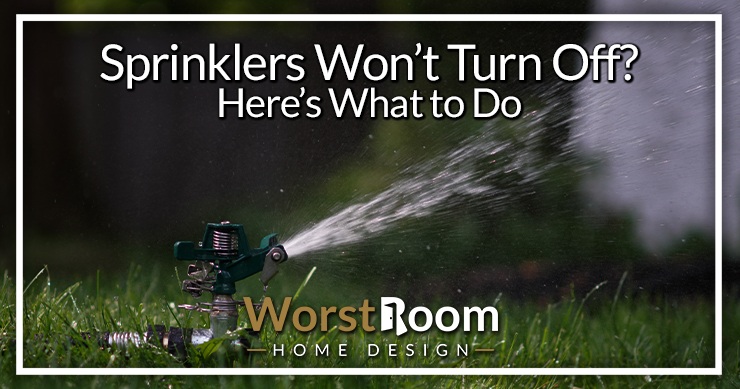
Are you have problems with your sprinkler system? If your sprinklers won't turn off, you're wasting valuable resources. Water is a precious commodity, and we all need to do our best to conserve it. That's kind of hard when it's pumping out of your sprinklers 24/7.
If your sprinklers keep running even after you shut down the system, you have a problem that needs addressing immediately. If the sprinklers don't shut off, they waste water, and you can expect a horrendous water bill at the end of the month.
Not to mention, the water will flood your yard, damage your lawn and flowerbeds, and possibly your home. If your sprinklers don't turn off, you'll need to examine the system, find the problem, and fix it. If you don't have handy skills, you'll need to call a professional to take care of it.
5 Checks When Your Sprinklers Won’t Turn Off
You can do a few things to assess the situation before you call the pros to handle it. We recommend running through the following diagnostics to see if you can identify the source of the issue. This is obviously for underground sprinkler systems and not the above-ground sprinkler system alternatives.
Check the Control Panel for the Sprinkler System
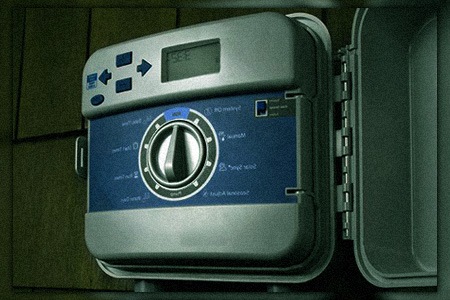
Start with examining the sprinkler system control panel. Sometimes, the issue might be an easy fix involving a hard reset of the system. If you recently experienced a power outage or surge during a lightning storm, this might be the cause of the problem affecting the system.
Inspect the control panel to see if it's still running. If you're using an electronic system, check to see if it remembers your settings for turning it on and off. An electricity surge might disrupt the system, removing your settings and causing it to operate indefinitely.
If the control panel is off and there's no information displayed, reset it by turning the power back on. You might have to repair or replace the control unit if this action doesn't force a system reset. Some systems require you to reset it using a paper clip to reach inside an inverted cavity and reboot the unit.
However, most premium sprinkler systems have a backup battery to prevent this problem. If that's the case, try removing the backup[ battery to force the reset. You don't need to reset the system if it's still running without the battery. You need to search for other problems.
Inspect the Main Water Supply Valve
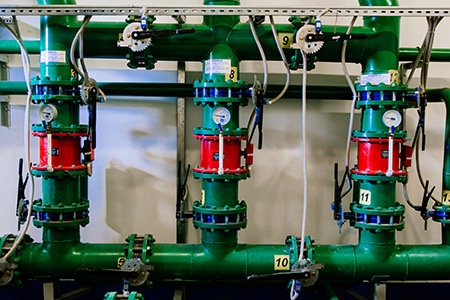
If the control unit is functioning normally, check the water mains. Sometimes the main water supply valve experiences clogging with dirt or debris, and the valve can't close properly. OR, you might have a broken valve causing the issue.
It's an obvious check and the next destination after checking the control panel. If the main water valve is leaking or dysfunctional. You'll need to call a qualified plumber to fix it unless you have plumbing experience.
The plumber can purge and clean the line if there's a clog. If the valve is broken or faulty, they'll replace it for you. Replacement valves are cheap and readily available. Most plumbers or landscaping professionals can fix it for you in a few hours.
Inspect the Other System Components
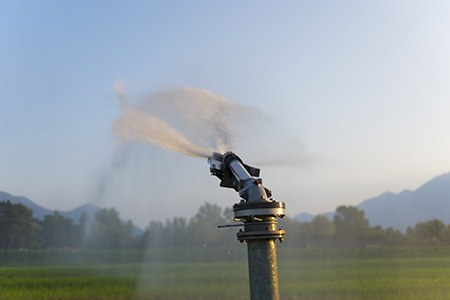
If the control panel is fine and there's no issue with the main water valve, the problem lies elsewhere in the system. If the sprinklers won't turn off at the right time and keep going, it might be a problem with the preset watering times because the controller isn't getting the right power or load to the panel.
An underpowered panel might cause a manual system to bypass the system altogether, resulting in continuous operation. If you have one at home, you can test for this problem using a multimeter. If you don't, call the professionals, who will test it for you and show you the results.
Don't attempt to rewire the system or control panel if you don't have any electrical experience – you're setting yourself up for a serious accident. Call an irrigation specialist or electrician to handle it for you; they know what they're doing and have plenty of experience with these problems.
Check for Stuck Levers & Screws
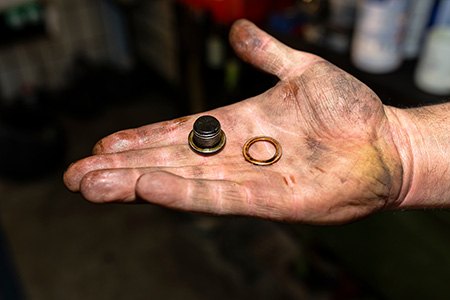
Occasionally, the internal levers and screws in the irrigation system get stuck in the open position. If this is the case, it's a simple fix you can do yourself. If you push the levers or screws back into place manually. It's usually enough to clear any blockages or debris blocking the proper functioning of the levers and screws.
Sometimes you'll have to open the water mains box in the system and manually turn off each lever or screw to stop the water and see which one is the problematic unit. It's time-consuming and painstaking, but you'll eventually find the troublesome screw or lever in the system.
If you reset the system and still have problems, call an irrigation specialist to handle it. They'll identify the issues and repair or replace the problematic screw or lever.
Is There Air Trapped Sprinkler Valves?
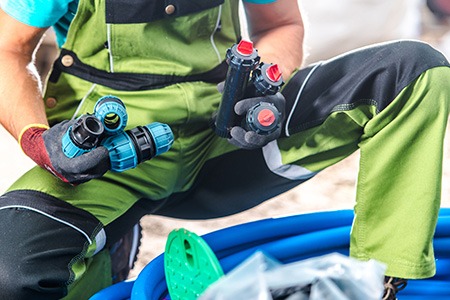
It's common for this problem of sprinklers not shutting off to occur the first time you use the system in the spring after it lays dormant for the winter. The valves might experience trapped air in the unit, causing them to remain in the open position.
Fortunately, this problem is an easy fix for homeowners. Ensure the main water supply is on and unscrew each screw or turn the lever. Let some water out of the system and close it.
This strategy flushes out air bubbles through whatever types of sprinkler heads you have, closing the master diaphragm valve and resolving your problem. If the problem continues, try purging the valves again.
Key Takeaways for When Your Sprinklers Won't Turn Off
Before you take the challenge head-on by yourself, consider the following safety measures and the most efficient order to look into each possible problem.
- Look for the most obvious point of failure first, starting with the control panel and main valve.
- Don't tamper with the backflow valve. This action introduces dirty water into the area's municipal water system, creating a health hazard.
- If you recently had a power failure or lightning storm, check the control panel and its battery.
These should cover the most obvious problems. Once you cover these, you’ve eliminated the most common faults and then can home in on the actual problem, if those didn’t solve it.
Know When It's Time to Call the Professionals
If you run through this list of potential issues and can't resolve the problem yourself, call the professionals for help. Look for an irrigation specialist in your area or a plumber with experience dealing with these systems. It's a good idea to review their website for customer testimonials to get an idea of what you can expect from their work.
If you are unsure what to do, leave it alone and call a professional. Don't risk trying to resolve it yourself, or you could make things worse. Forcing a repair might damage the system, causing the need for costly repairs, and you'll end up kicking yourself for not leaving not alone.
A professional has the tools and experience to identify and repair the problem of when your sprinklers won't turn off. You might have to pay them for their work, but it's better than causing damage requiring expensive equipment replacement or repairs.
FAQs for When Your Sprinkler System Won't Turn Off
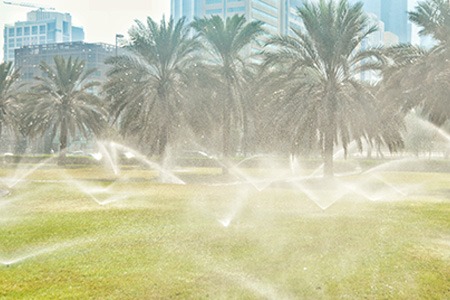
When we start talking about times when a sprinkler zone won't turn off or a sprinkler valve won't shut off, there's always more questions that arise. Let's cover those now.
When Do I Stop Using the Sprinkler System & When Do I Service It?
Unless you live in Florida or the Gulf States, there's no need for you to run the sprinkler system all year. The rainy season differs from state to state; chances are you won't need to run your sprinklers when there's plenty of rain around.
Likewise, you won't need to use the sprinklers in the wintertime in most states. If you live in an area of the United States that experiences freezing weather, ensure you winterize your sprinkler system to prevent damage from the cold ground and weather. Water freezes pretty quickly and expands and will bust your pipes.
If you move into a new home with a sprinkler system and don't know when to activate it, speak to your neighbors and find out what they do to water their gardens. Ask them about their watering schedule and how long you can go between waterings without drying out the yard.
How Do I Flush the Sprinkler Irrigation Valve?
It's common for dirt and debris to find their way into the sprinkler system and cause blockages leading to continuous watering and other problems. If that's the case, you'll need to know how to purge the procedure to remove the debris.
It's an easy repair, and you start the process by shutting the main water valve to the system and flushing it. Unscrew the irrigation systems solenoid and check if you can move the valve plunger. Remove the diaphragm and screws inside the valve, rinse them and inspect for damage. Flush the valve body to remove any debris, dirt, or pebbles causing the problem.
Where is the Shut-Off Valve for the Sprinkler?
Most repairs and troubleshooting involving your sprinkler system require you to shut off the main valve unless you had a secondary valve installed. You can locate it between the water supply main for your home and the control panel for the irrigation system.
You might also find it near an outdoor water main or faucet in the yard. If it's outside in the garden, look for a box. The box protects the valve from damage and the elements.
That’s the Procedure for When Your Sprinklers Won’t Turn Off
Now that you know what to do, you could even write a note to yourself on an index card to put in your garage for the right items to check in the right, specific order when your sprinklers won't turn off. That way you aren’t panicking and having to consult the internet in a hurry.



